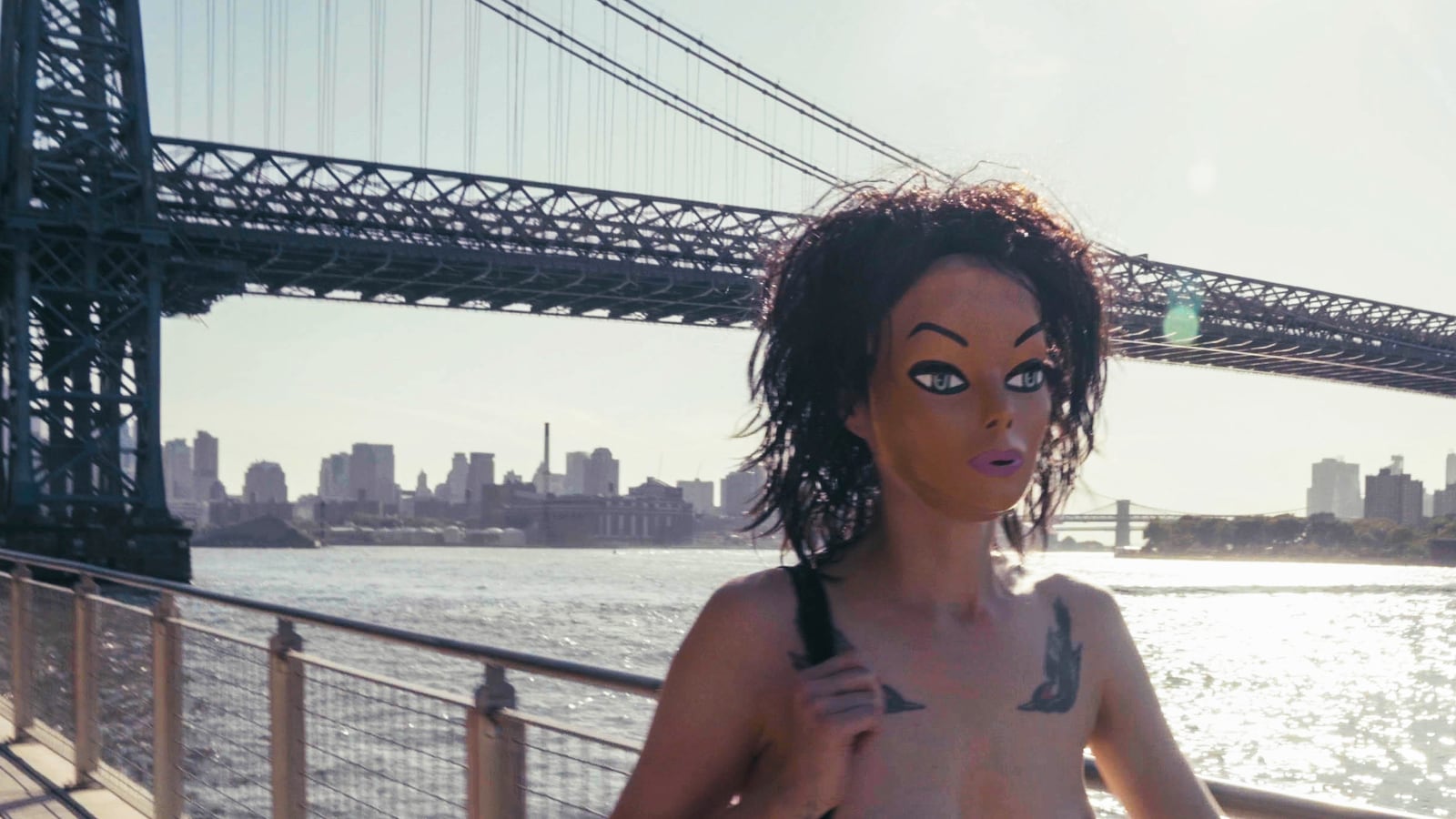Close to a dozen women and trans men—of varying shapes, colors, and sizes—strut down the streets of New York City to a pulsing electro beat. Each dons a mannequin-like mask and no top, their breasts exposed to the elements, be they heckling men or oncoming traffic. These valorous vessels of female empowerment are the subjects Narcissister: Breast Work, a new documentary short that debuted at the Sundance Film Festival.
Directed by Narcissister, a New York-based performance artist known for her explorations of the female body, the 10-minute film sees the various nude people traverse different neighborhoods in Manhattan and Brooklyn—Harlem, Chinatown, Upper East Side, Upper West Side, and Williamsburg—in order to assert control of their own bodies, and sexuality. (It’s been legal for women to be topless in New York City since 1992.)
“It was inspired by my being a New Yorker and knowing for a long time about the legality of bare-breastedness for women in the streets of New York, but having never seen one woman exercise her rights in the course of quotidian existence in this city,” offers Narcissister. “So I wanted to create a stylized portrayal of what it would be like to exercise our right to bare our breasts in the streets of New York.”
The mask is a repurposed wig form, designed by the late Los Angeles artist Verna Doran for her company Plasti-Personalities in 1965. Narcissister happened upon it while designing store displays, and made it her signature.
“It’s meant to be an antidote to what I feel are problematic trends in society right now—extreme narcissism, and extreme involvement with self. The mask enables there to be a commentary on all of that,” she says, adding, “The Narcissister mask gave us a level of protection in emboldening us to bare our breasts.”
Narcissister shot the film over just five days, casting her friends, collaborators and fellow performers as her topless army of Narcissisters. And, while she conceived of it as a “love letter to New York,” it’s also an extension of the “Free the Nipple” movement, fighting back against ordinances banning women from going topless—as well as the notion that women’s bodies are sex objects. Text occasionally runs over the film footage, with messages like: “These laws and the cultural consensus behind them are based on gender bias and a fear of, and a desire to control, women’s bodies.”
“I did think there was something very intense about the softness—and femininity—of the breasts juxtaposed with the hard edges and concrete of the city. I feel like there was something strong in that juxtaposition. There’s something about making oneself so vulnerable as a woman in this city of intense energy,” says Narcissister.
The one neighborhood where they ran into trouble, strangely enough, was the East Village. In one scene, you see a man mock one of the topless women; in another, a man yells at one of the women, telling them they’re “going to hell.” The optics presented a problem for Narcissister, an intersectional feminist of Moroccan-Jewish and African-American descent.

“It got very complicated for me, being a person of color and that my father was African-American. There were a lot of men loitering about in the East Village, and most of them were black, and those were the few instances where somebody actually heckled us,” she recalls. “That was intense for me, being a person of color and thinking about race in my project, but the men who assert their presence in the film in a way that ends up being unsavory, or not positive, they were all black men.”
“In the short time that we did film, this is what was real,” she continues. “And I got criticism when I showed people early cuts of the film, about how the only men who respond badly or poorly or offensively in the film are black, and the thing is, I didn’t want to hide that because I really wanted to document it if we did this gesture, and that’s what happened. I don’t want to hide the reality of street life in New York. We didn’t look for those reactions.”
The cumulative effect of Breast Work is one of benignity; these topless people, marching down the streets with intense purpose, feel very much like part of the fabric of the city. It feels normal, as it should.
“I like to think that, in my own small way, I’m contributing to the increased safety and liberation for women and their bodies in this country,” says Narcissister. “Some would say a woman taking her shirt off in the street is not a subtle gesture, but I think the fact that we shot it without a lot of pretense or planning, that suits my sensibility of activism being available to everybody, and how it can be impactful in its simplest and subtlest forms.”


